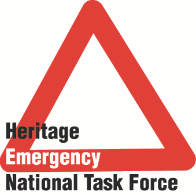PREPARATION
- Gather your staff and review your disaster plan today. No disaster plan? Put that at the top of the to-do list once the storm passes (and hope you didn’t need it this time). See these Disaster Plan Templates.
- If you have a disaster plan, make sure everyone has a printed copy to take home. An electronic version may be useless if you lose power.
- Make sure staff, volunteer, and board contact lists are up to date. Determine how you will communicate with one another before, during, and after the storm.
- Make sure your insurance and disaster recovery vendor contact information is readily available.
- Back up electronic records and store the back-ups off-site or in the cloud.
- Secure outdoor furniture, bike racks, book drops, signage, etc. – anything that can become a projectile in strong winds.
- Move collections that are in areas vulnerable to flooding (i.e., the floor, the basement) or susceptible to rain (near windows or under roofs) out of harm’s way.
- If you have time, cut lengths of plastic sheeting to be able to throw them over shelves, cabinets, or equipment should the building envelope be compromised.
- Know the location and shut-off procedures for water, electricity, and gas.
- Review individual or family plans. You’ll feel better attending to your organization knowing that your loved ones are safe.
RECOVERY
- Keep this 24/7 hotline number handy: 202.661.8068. The National Heritage Responders, a team of trained conservators and collections care professionals administered by the Foundation of the American Institute for Conservation, are available 24/7 to provide advice.
- Download the FEMA mobile app for disaster resources, weather alerts, and safety tips. The app (available in English and Spanish) provides a customizable checklist of emergency supplies, maps of open shelters and recovery centers, disaster survival tips, and weather alerts from the National Weather Service. The app also enables users to receive push notifications reminding them to take important steps to prepare their homes and families for disasters.
- Download the FEMA fact sheets, "After the Flood: Advice for Salvaging Damaged Family Treasures" and "Salvaging Water-Damaged Family Valuables and Heirlooms," which offer tips and resources on salvaging different types of objects, from photos to fabric to furniture, and more. (Available in multiple languages.)
- Request funding frm the SAA Foundation National Disaster Recovery Fund for Archives. Originally established to address the stabilization and recovery needs of archival repositories affected by Hurricane Katrina, this fund now provides grants that support the recovery of archives collections from major disasters, regardless of region or repository type.
- Cultural institutions in FEMA-designated disaster areas of Texas, Louisiana, Florida, and other impacted states and U.S. territories can apply immediately for NEH Chairman’s Emergency Grants of up to $30,000 to preserve documents, books, photographs, art works, historical objects, sculptures, and structures damaged by the hurricane and subsequent flooding.
- Applying for Federal Disaster Assistance: For arts organizations and cultural institutions affected by recent hurricanes, these resources will walk you through the process of applying for Federal disaster assistance in Florida or in Texas.
 FEMA and the Smithsonian Institution co-sponsor the Heritage Emergency National Task Force, a partnership of 42 national service organizations and federal agencies created to protect cultural heritage from the damaging effects of natural disasters and other emergencies.
FEMA and the Smithsonian Institution co-sponsor the Heritage Emergency National Task Force, a partnership of 42 national service organizations and federal agencies created to protect cultural heritage from the damaging effects of natural disasters and other emergencies.
« MayDay: Saving Our Archives (Home)
 FEMA and the Smithsonian Institution co-sponsor the Heritage Emergency National Task Force, a partnership of 42 national service organizations and federal agencies created to protect cultural heritage from the damaging effects of natural disasters and other emergencies.
FEMA and the Smithsonian Institution co-sponsor the Heritage Emergency National Task Force, a partnership of 42 national service organizations and federal agencies created to protect cultural heritage from the damaging effects of natural disasters and other emergencies.